Joshua Albrecht
Tune As You Scale: Hyperparameter Optimization For Compute Efficient Training
Jun 13, 2023Abstract:Hyperparameter tuning of deep learning models can lead to order-of-magnitude performance gains for the same amount of compute. Despite this, systematic tuning is uncommon, particularly for large models, which are expensive to evaluate and tend to have many hyperparameters, necessitating difficult judgment calls about tradeoffs, budgets, and search bounds. To address these issues and propose a practical method for robustly tuning large models, we present Cost-Aware Pareto Region Bayesian Search (CARBS), a Bayesian optimization algorithm that performs local search around the performance-cost Pareto frontier. CARBS does well even in unbounded search spaces with many hyperparameters, learns scaling relationships so that it can tune models even as they are scaled up, and automates much of the "black magic" of tuning. Among our results, we effectively solve the entire ProcGen benchmark just by tuning a simple baseline (PPO, as provided in the original ProcGen paper). We also reproduce the model size vs. training tokens scaling result from the Chinchilla project (Hoffmann et al. 2022), while simultaneously discovering scaling laws for every other hyperparameter, via an easy automated process that uses significantly less compute and is applicable to any deep learning problem (not just language models).
On the stepwise nature of self-supervised learning
Mar 27, 2023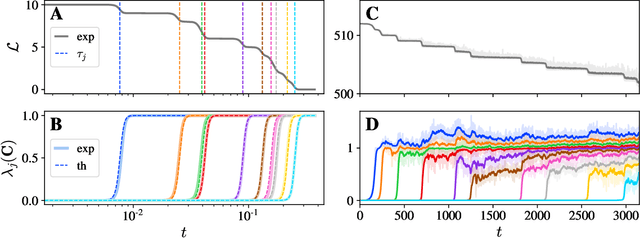
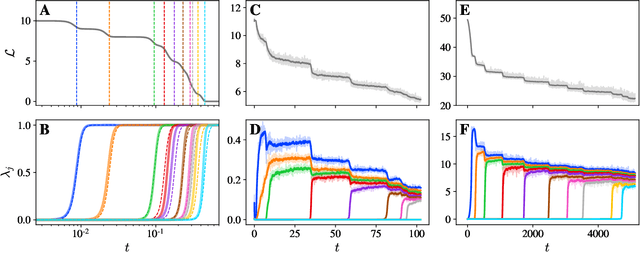

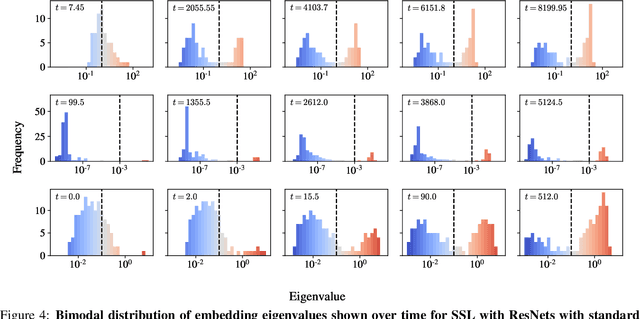
Abstract:We present a simple picture of the training process of self-supervised learning methods with joint embedding networks. We find that these methods learn their high-dimensional embeddings one dimension at a time in a sequence of discrete, well-separated steps. We arrive at this conclusion via the study of a linearized model of Barlow Twins applicable to the case in which the trained network is infinitely wide. We solve the training dynamics of this model from small initialization, finding that the model learns the top eigenmodes of a certain contrastive kernel in a stepwise fashion, and obtain a closed-form expression for the final learned representations. Remarkably, we then see the same stepwise learning phenomenon when training deep ResNets using the Barlow Twins, SimCLR, and VICReg losses. Our theory suggests that, just as kernel regression can be thought of as a model of supervised learning, \textit{kernel PCA} may serve as a useful model of self-supervised learning.
Despite "super-human" performance, current LLMs are unsuited for decisions about ethics and safety
Dec 13, 2022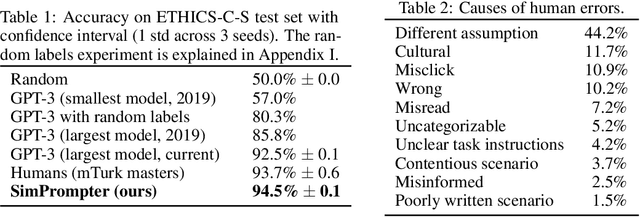



Abstract:Large language models (LLMs) have exploded in popularity in the past few years and have achieved undeniably impressive results on benchmarks as varied as question answering and text summarization. We provide a simple new prompting strategy that leads to yet another supposedly "super-human" result, this time outperforming humans at common sense ethical reasoning (as measured by accuracy on a subset of the ETHICS dataset). Unfortunately, we find that relying on average performance to judge capabilities can be highly misleading. LLM errors differ systematically from human errors in ways that make it easy to craft adversarial examples, or even perturb existing examples to flip the output label. We also observe signs of inverse scaling with model size on some examples, and show that prompting models to "explain their reasoning" often leads to alarming justifications of unethical actions. Our results highlight how human-like performance does not necessarily imply human-like understanding or reasoning.
Avalon: A Benchmark for RL Generalization Using Procedurally Generated Worlds
Oct 24, 2022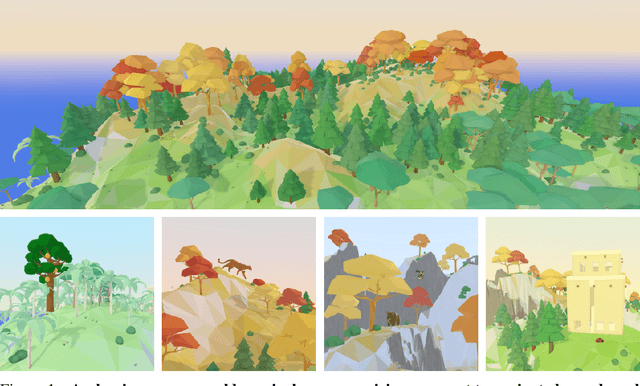



Abstract:Despite impressive successes, deep reinforcement learning (RL) systems still fall short of human performance on generalization to new tasks and environments that differ from their training. As a benchmark tailored for studying RL generalization, we introduce Avalon, a set of tasks in which embodied agents in highly diverse procedural 3D worlds must survive by navigating terrain, hunting or gathering food, and avoiding hazards. Avalon is unique among existing RL benchmarks in that the reward function, world dynamics, and action space are the same for every task, with tasks differentiated solely by altering the environment; its 20 tasks, ranging in complexity from eat and throw to hunt and navigate, each create worlds in which the agent must perform specific skills in order to survive. This setup enables investigations of generalization within tasks, between tasks, and to compositional tasks that require combining skills learned from previous tasks. Avalon includes a highly efficient simulator, a library of baselines, and a benchmark with scoring metrics evaluated against hundreds of hours of human performance, all of which are open-source and publicly available. We find that standard RL baselines make progress on most tasks but are still far from human performance, suggesting Avalon is challenging enough to advance the quest for generalizable RL.
 Add to Chrome
Add to Chrome Add to Firefox
Add to Firefox Add to Edge
Add to Edge